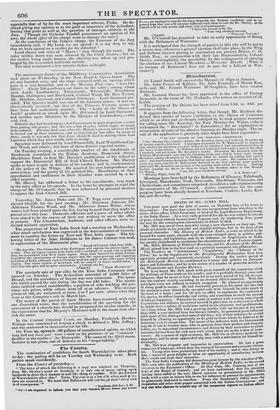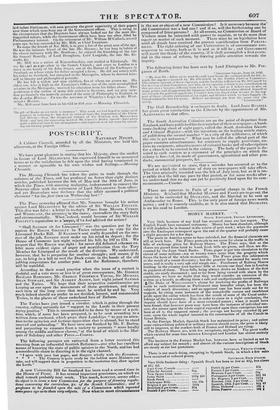DEATH OF MR. JAMES MILL.
This great man paid the debt of nature on Thursday last, at his house in Kensington. For more than a year he was incapacitated froni attending to the duties of his office, Chief Examiner, or head of the Land Revetue Department, at the India House. At a very early period of his life he was subject to attacks of gout, which latterly became niore frequent, and, by weakening hint, paved the way for the consumption (bronchial) of which he died.
Mr. Mill was one of those men who stamp a new character on their age. We allude not merely to his powerful and original writings, but to the force of his personal character. His History of British India, a work on which he la- boured for many years, abounds with the most enlarged views in politics, poli- tical economy, and legislation, and, by its influence on Englishmen in India, has greatly contributed to ameliorate the administration of our Eastern empire.
Mr. Mill's Elements of Political Economy, and his Analysis of the Human Mind, placed him in the first rank as a political economist and philosopher. The Treatises on " Government," " Legislation," the " Liberty of the
Press," &c. in the Supplement to the Encyclopedia Britaranica, have been separately printed and extensively circulated. During the earlier period of the Edinburgh Review he contributed to it many able articles on Jurispru- dence and Education ; and he is the author of a number of powerful articles in the Westminster and London Reviews.
We hc.ve heard Mr. Mill speak with great warmth of the impression which
the writings of Plato made on his youth ; and it is probably through some such influence, that he seems to have been led at an early period of his life to regu- late his conduct strictly according to an elevated ethical standard. With him principles were not suffered to remain unapplied. He allowed no opportunity of doing good to escape. He had constantly present to his mind the idea that the moment a man collies to be occupied only with himself he sinks nearly to the level of a brute ; and his life was an effort to ameliorate the condition of his species, to diffuse knowledge and virtue, and contribute to swell the amount of human happiness. Whenever lie came in contact with a young man of good dispositions and abilities, lie exerted himself to place him in a situation in which lie might have a sphere of usefulness suited to his character and qualifications. At a time when Mr. Mill had a growing family, with an income of not more than 3001. a year derived from his literary labours, he possessed great influence with most of the distinguished men of the day ; and of that influence he availed himself by allowing no opportunity to do good to those whom he believed to be deserving men to escape him. The secret of his influence with the Government may be of use to literary men, who in general, from their profuse and irregular habits, are in dependent circumstances, and driven by their necessities to solicit accommodations from the rich men with whom they are in the habits of inter- course. By a sy-stein of rigid economy, Mr. Mill was at all times perfectly in- dependent, and he never approached any man with a solicitation for himself in • dividually.
Mr. Mill was eloquent and impressive in conversation. He bad a great
command of language, which bore the stamp of his earnest and energetic charac-
ter. Young men were particularly fond of his society ; and it was always to him a source of great delight to have an opportunity of contributing to form their minds and exalt their character. The East India Company did themselves great honour by the selection of Mr.
Mill, soon after the publication of the history of British India, to the second situation in the Examiner's Office. At that time, Mr. Canning was at the but I of the Board of Control; and we have understood, that his attention having been called to the very liberal opinions on government in Mr. Mill's book, with a view to induce him to use his influence to prevent the appointment, he generously disdained to interfere. From the Examiner's Office issue the despatches and other state papers connected with the Indian Government: and any one who chooses to consult any of the numerous reports on Indian affairs
laid before Parliament, will won perceive the great superiority of their papers over those which issue from any of the Government offices. This is owing to the circumstance that the Directors have always looked out for the most dis- tinguished talents, while the Government offices have been too ofteu filled by Parliamentary interest. On the retirement of Mr. William APCulloch, several years ago, he was succeeded by Mr. Mill, as Chief Examiner.
To name the friends of Mr. Mill, is to give a list of the great men of the age. He was the intimate friend of the late Mr. Horner; he was long in habits of the closest intimacy with Mr. Bentham ; he enjoyed the friendship of the late Sir Samuel Romilly, of Lord Brougham, Lord Langdale, the late Mr. Ri- cardo, &e.
Mr. Mill was a native of Kincardineshire, and studied at Edinburgh. Ile wa, tic ael as a pr.,.:cher in the Scotch Church ; and came to London as a tutor in the family of Sir Jobh Stuart, one of the Barons of the Exchequer in Scotland, on whose estate his father occupied a farm. lie did not return with his father to Scotland, but remained in the Metropolis, where he devoted him- self to literary and philosophical pursuits.
He has lett a widow and nine children, five of whom are grown up. His eldest son, who is high in the Examiner's Office, one of the most accomplished scholars in the Metiopolis' received his education from his father alone. This gentleman is the author of many able articles in Reviews, and we may men- tion pal ticularly the masterly account of the state of Philosophy in England, in the Le mlon Review. lie was the reviewer of Whateley's Logic in the West• minshT Bee iew.
Mr. Mill must have been in his fi2d or.63d year.—Morning Chronicle.
The pil.• of Books on our table is immense! This week we had hoped to make great progress in redwing it : but, first in order of time. the importance of the Finan- cial Debate-then, the temporary interest of the NOkToN and MELBOURNE Trial-and last, the surpassing merit of Mr. f :ROTE'S Ballot Speech-have given quite a different turn to our arrangements, and deprived us of the rump for execut- ing our literary projects.
_ .



























 Previous page
Previous page